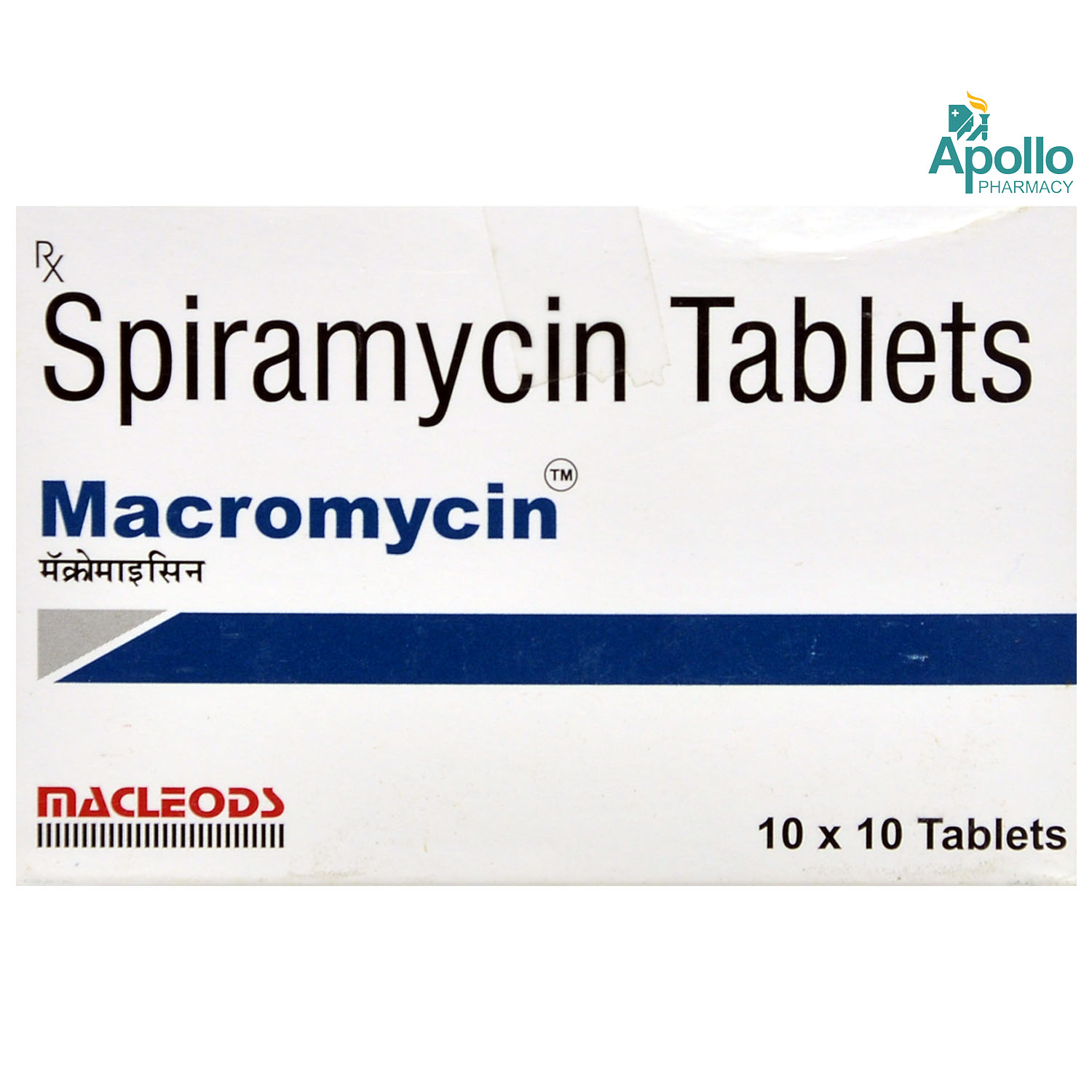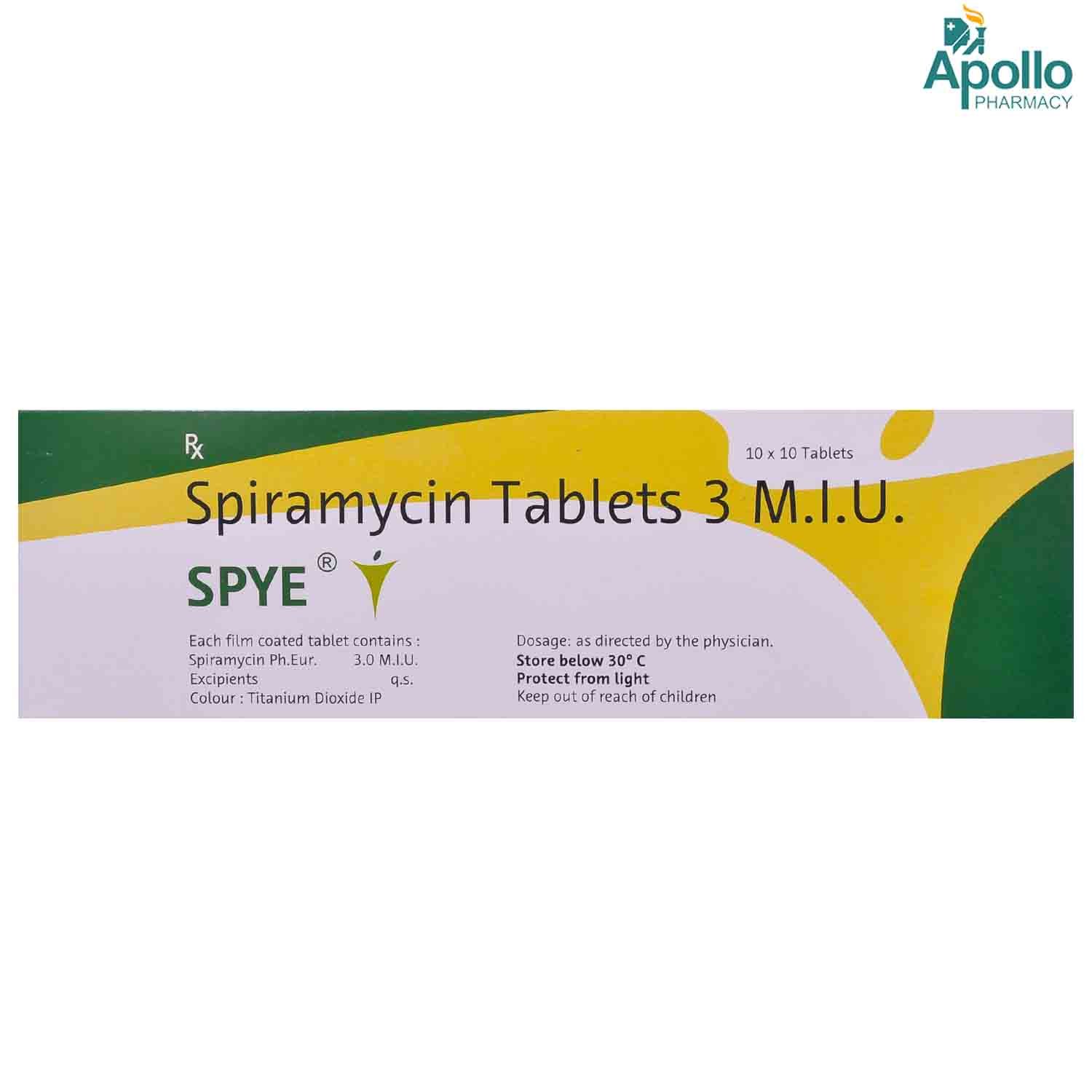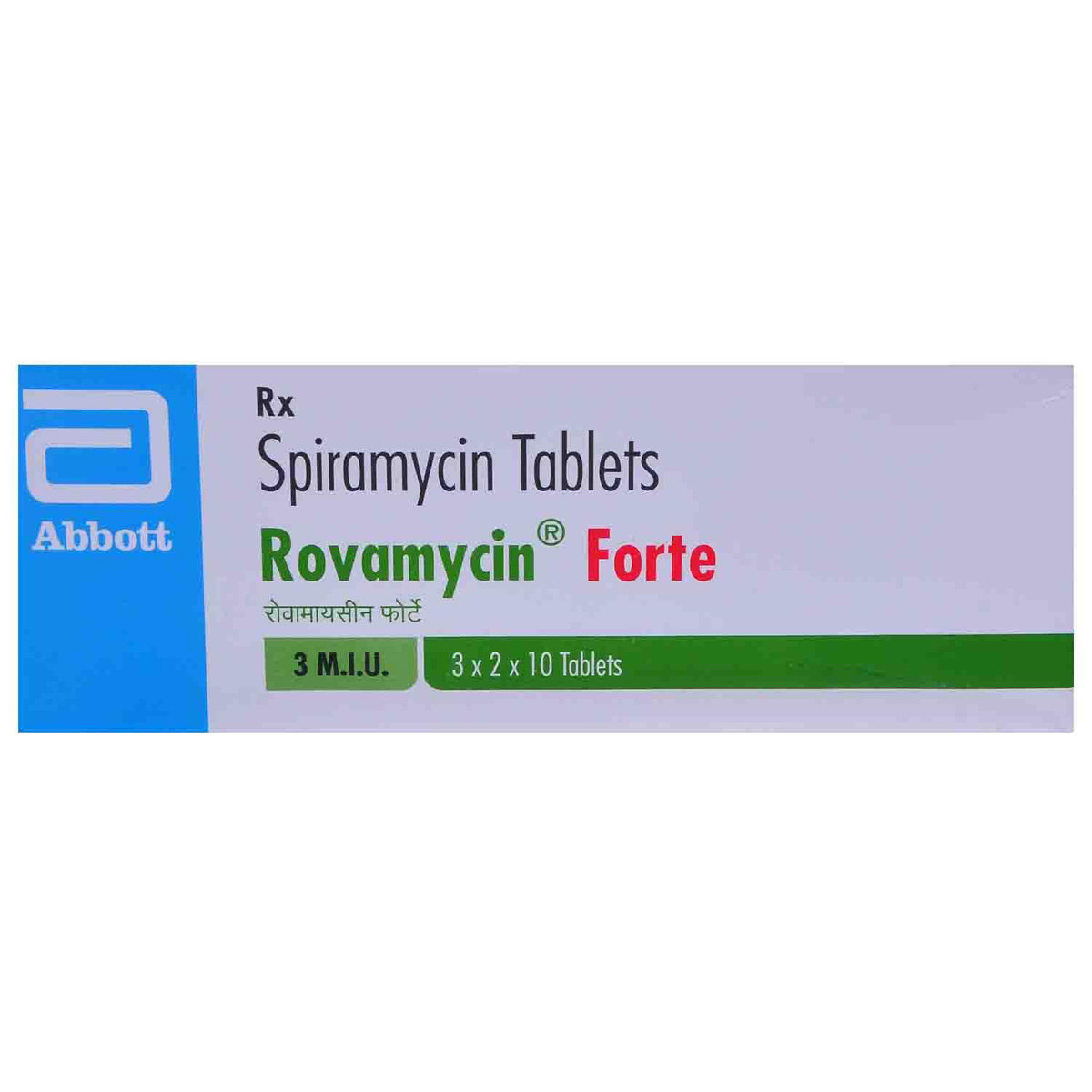Spiramycin
About Spiramycin
Spiramycin belongs to a group of medicines known as macrolide antibiotics primarily used to treat cryptosporidiosis (a diarrheal disease caused by microscopic parasites, cryptosporidium), susceptible infections, and soft tissue infections. It is also used to treat a parasitic infection known as toxoplasmosis in pregnant women. It helps to lower the risk of transmission of toxoplasma infection from the mother to the unborn child. A bacterial infection is a condition in which bacteria grows in the body and causes infection. It can target any body part and multiple very quickly. Toxoplasmosis infection can cause complications such as miscarriage, stillbirth, and damage to a baby’s brain and other organs, particularly the eyes, at birth or early childhood, or even as adults with a weak immune system.
Spiramycin contains ‘Spiramycin,’ an antibiotic that treats bacterial infections of the abdomen, bone, skin, heart, and soft tissues. It may also be used to reduce the risk of a serious parasite infection (toxoplasmosis) spreading to an unborn baby during pregnancy. Spiramycin works by inhibiting bacterial protein synthesis, which inhibits bacterial growth. It shows a bacteriostatic effect, which stops bacterial and parasitic reproduction but doesn't kill them.
Take Spiramycin as prescribed by your doctor. You are advised to take Spiramycin for the duration as prescribed, depending on your medical condition. Spiramycin causes side effects in some people. Common side effects of Spiramycin include stomach pain, nausea, vomiting, and diarrhea. Most of these side effects of Spiramycin do not require medical attention and gradually resolve over time. However, if the side effects persist or worsen, please consult your doctor.
If you are known to be allergic to Spiramycin or any other medicines, please tell your doctor. Do not use Spiramycin while having vaccinations with live bacterial vaccines (typhoid vaccine) since Spiramycin may affect the vaccine's activity. Spiramycin should be used only with a doctor's advice during pregnancy and breastfeeding. Do not give this medicine to your child without medical advice. Tell your doctor if you have liver problems, muscle problems (myasthenia gravis), heart rhythm disorder (arrhythmia), porphyria (rare genetic blood disorder), or electrolyte imbalance (low potassium or magnesium level).
Uses of Spiramycin
Medicinal Benefits
Spiramycin contains ‘Spiramycin’ as an antibiotic that treats bacterial infections like various infections of the abdomen, bone, skin, heart and soft tissues. It may also reduce the risk of a serious parasite infection (toxoplasmosis) spreading to an unborn baby during pregnancy. Spiramycin works by inhibiting bacterial protein synthesis, which inhibits bacterial growth. It shows a bacteriostatic effect, which stops bacterial reproduction but doesn't kill them. Spiramycin effectively treats infections caused by gram-positive and aerobic (living with air) bacteria, including susceptible strains of Staphylococcus aureus, Streptococcus pneumonia, N. gonorrhoea, gram-negative bacteria, and cryptosporidium spices. Spiramycin treats serious infections caused by susceptible aerobic bacteria in the abdomen, gastrointestinal tract, lower respiratory tract, skin, and in genitourinary area. It will not work for viral infections (such as the common cold or flu).
Directions for Use
- Spiramycin can be taken with or without food as advised by a doctor.
- Follow your doctor’s recommendations on the dosage and timing of this medication to achieve optimal results.
- Swallow it as a whole with a glass of water.
- Do not crush, chew, or break it.
Storage
Side Effects of Spiramycin
- Nausea
- Vomiting
- Abdominal pain
- Diarrhea
- Allergy
- Abnormal liver function
- Abnormal heart rate
- Hypotension
Drug Warnings
Do not use Spiramycin if you are allergic to Spiramycin or its components. Tell your doctor if you have liver problems, muscle problems (myasthenia gravis), heart rhythm disorder (arrhythmia), porphyria (rare inherited blood disorders), or electrolyte imbalance (low potassium or magnesium level). Regular monitoring of liver function tests may be required while using Spiramycin. In rare cases, the use of Spiramycin can cause diarrhoea, so in case you have watery or bloody diarrhoea, stop taking Spiramycin and call your doctor. However, do not take any anti-diarrheal medicine until your doctor tells you. Spiramycin is safe to use during pregnancy. However, please consult your doctor if you are pregnant, planning for pregnancy, or breastfeeding before using Spiramycin. It should be taken by the children only if the doctor has prescribed it. In some cases, Spiramycin may cause a condition that affects the heart rhythm (QT prolongation). QT prolongation can rarely cause fast/irregular heartbeat and other symptoms (such as severe dizziness and fainting) that need medical attention immediately. Elderly adults may be more sensitive to the side effects of Spiramycin, especially QT prolongation. Spiramycin may cause live bacterial vaccines (such as typhoid vaccine) to not work as well. Do not have any immunizations/vaccinations while using this medication unless your doctor tells you to. Do not skip the doses and finish the full course of treatment even if you feel better. Stopping the Spiramycin too early may lead to the infection returning or worsening.
Drug Interactions
Drug-Drug Interaction: Spiramycin have interactions with ergot alkaloids (ergotamine, dihydroergotamine), drugs used to treat abnormal heart rhythm (amiodarone, dofetilide, pimozide, procainamide, quinidine), macrolide antibiotics (erythromycin).
Drug-Food Interaction: No relevant drug-food interaction was found with Spiramycin. As a precautionary measure, the consumption of alcoholic beverages should be avoided as it may lead to drowsiness and dizziness.
Drug-Disease Interaction: Spiramycin should not be given to people with liver problems, muscle problems (myasthenia gravis), heart rhythm disorder (arrhythmia), electrolyte imbalance (low potassium or magnesium level), colitis (inflammation of the intestine), and porphyria (rare genetic blood disorder).
Drug-Drug Interactions Checker List:
Safety Advice

Alcohol
cautionAvoid taking alcohol while using Spiramycin since it may worsen the side effects.

Pregnancy
cautionSpiramycin is a pregnancy category C drug. If you are pregnant, think you may be pregnant, or planning pregnancy, consult your doctor before taking Spiramycin. Your doctor may prescribe this medicine only if the benefits outweigh the risks.

Breast Feeding
cautionSpiramycin may be excreted into breast milk and may harm your infant. Please consult your doctor before taking Spiramycin if you are breastfeeding.

Driving
cautionYou may experience dizziness by taking Spiramycin. In such cases, do not drive or operate machinery until you feel better.

Liver
cautionSpiramycin is used with caution in patients with liver disease. If you have liver problems, consult your doctor before taking Spiramycin. Your doctor may adjust the dose or prescribe a suitable alternative based on your condition.

Kidney
cautionIf you have kidney problems, consult your doctor before taking Spiramycin. Your doctor may adjust the dose or prescribe a suitable alternative based on your condition.

Children
cautionYour doctor will prescribe Spiramycin depending on your child's age and body weight.
Habit Forming
Diet & Lifestyle Advise
-
Probiotics should be taken after taking a full course of Spiramycin in order to restore some of the healthy bacteria in the intestines that may have been killed. Taking probiotics after antibiotic treatment can reduce the risk of antibiotic-associated diarrhoea. Certain fermented foods like yoghurt, cheese, sauerkraut, kombucha, and kimchi can help to restore the good bacteria of the intestine.
-
Include more fibre-enriched food in your diet, as it can be easily digested by gut bacteria, which helps stimulate their growth. Thus, fibre foods may help restore healthy gut bacteria after antibiotics. Whole grains like whole-grain bread and brown rice should be included in your diet.
-
Avoid taking too much calcium, iron-enriched foods, and drinks as it might affect the working of Spiramycin.
-
Avoid intake of alcoholic beverages with Spiramycin as it can make you dehydrated and affect your sleep. This can make it harder for your body to aid the Spiramycin in fighting off infections.
Special Advise
-
Liver function monitoring (liver function tests) is recommended in patients with severe liver disease.
-
Spiramycin may cause Clostridium difficile-associated diarrhea (CDAD); hence it is advised to undergo regular gastrointestinal screening.
Patients Concern
Disease/Condition Glossary
A bacterial infection: It is a condition in which harmful bacteria enter, multiply, and infect our body. It can target any body part and multiple very quickly. When you get infected with bacteria, you can experience generalized symptoms like fevers, chills, and fatigue. Bacteria are of various forms comprising, commonly spherical, rod, and spiral-shaped. Bacterial infections vary from minor illnesses like sore throat and ear infections to severe brain infections like meningitis and encephalitis. Few harmful bacteria that cause infections include Streptococcus, Staphylococcus, and E. coli. Anyone can become infected with a bacterial infection. But, people with weak immune systems or taking immunosuppressive medicine can make you more prone to bacterial infection.
Toxoplasmosis: is an infection caused by parasites toxoplasma gondii found in contaminated food and cat feces. It can cause serious complications for pregnant women, such as miscarriage, stillbirths, and damage to the baby’s brain and other organs, particularly the eyes, at birth or early childhood, and people with weakened immune systems. Symptoms include muscle pain, fever, headache, etc.
FAQs
Spiramycin is used to treat cryptosporidiosis (a diarrheal disease caused by microscopic parasites, cryptosporidium), susceptible infections, and soft tissue infections. It is also used to treat a parasitic infection known as toxoplasmosis in pregnant women. It helps to lower the risk of transmission of toxoplasma infection from the mother to the unborn child.
Spiramycin contains Spiramycin' which works by preventing the synthesis of essential proteins required by bacteria and parasites to carry out vital functions. Thus, it stops the bacteria or parasite's growth and prevents the infection from spreading.
You are not recommended to use Spiramycin with amiodarone (a medicine used to treat abnormal heart rhythm) simultaneously as it may affect the heart rhythm (QT prolongation). QT prolongation can rarely cause serious and sometimes fatal fast/irregular heartbeat and other symptoms (such as severe dizziness and fainting) that need immediate medical attention. However, please consult a doctor before using Spiramycin with any other medicines.
Spiramycin can affect live vaccines like typhoid vaccine and decrease their effectiveness. Please consult a doctor before you start Spiramycin if you are undergoing any vaccinations.
Do not use anti diarrhoeal until the doctor has prescribed you. You can drink plenty of fluids (electrolytes) to avoid dehydration. Besides this, you can also take prebiotics or probiotics to manage diarrhoea, as it may help increase the number of good bacteria in the intestine, which aids in digestion.
In some cases, people using Spiramycin may have a fungal infection called thrush after taking its full course. It happens because antibiotics also kill the harmless bacteria that protect against thrush.
No. You should complete the full course of Spiramycin as your doctor prescribes. Take Spiramycin at the right dose, times, and for the right number of days.
The side effects of Spiramycin include nausea, vomiting, dizziness, diarrhoea, stomach pain, abnormal heart rate and hypotension (low blood pressure). If these side effects persist or worsen, please consult your doctor.
Spiramycin generally starts working immediately after taking it. However, to kill all the harmful bacteria and make you feel better it may take few days.
If you don't feel better after completing the full course of treatment with Spiramycin, inform your doctor. Also, let your doctor know if your symptoms are worsening while taking Spiramycin.
There is no strong evidence suggesting that Spiramycin causes infertility in either males or females. However, if you have any concerns, please discuss with your doctor.






